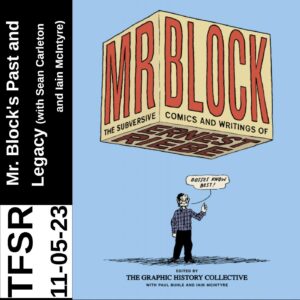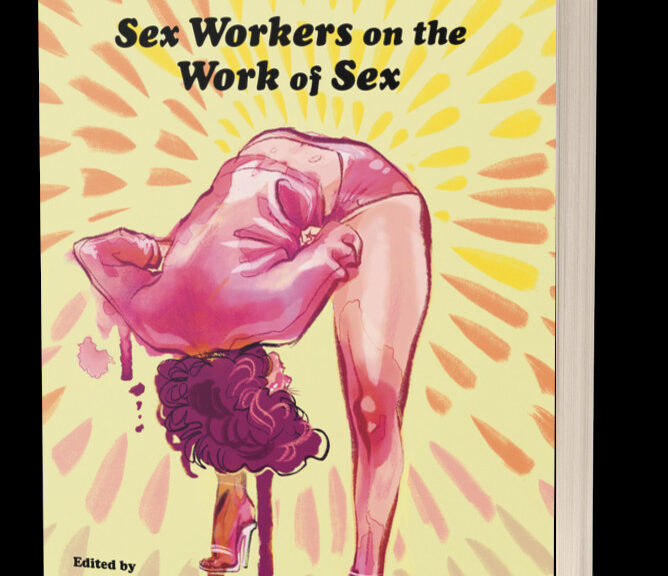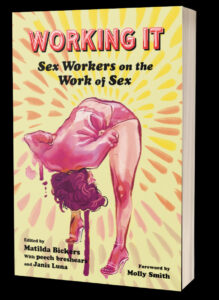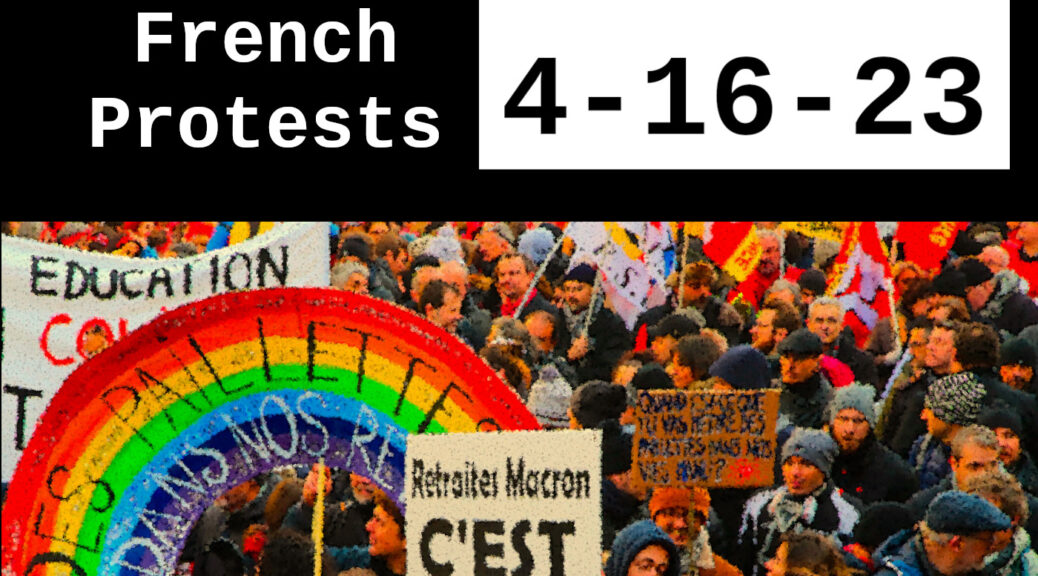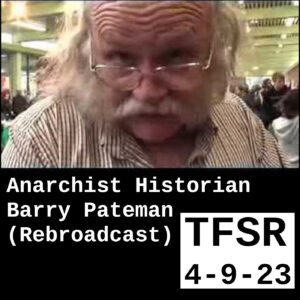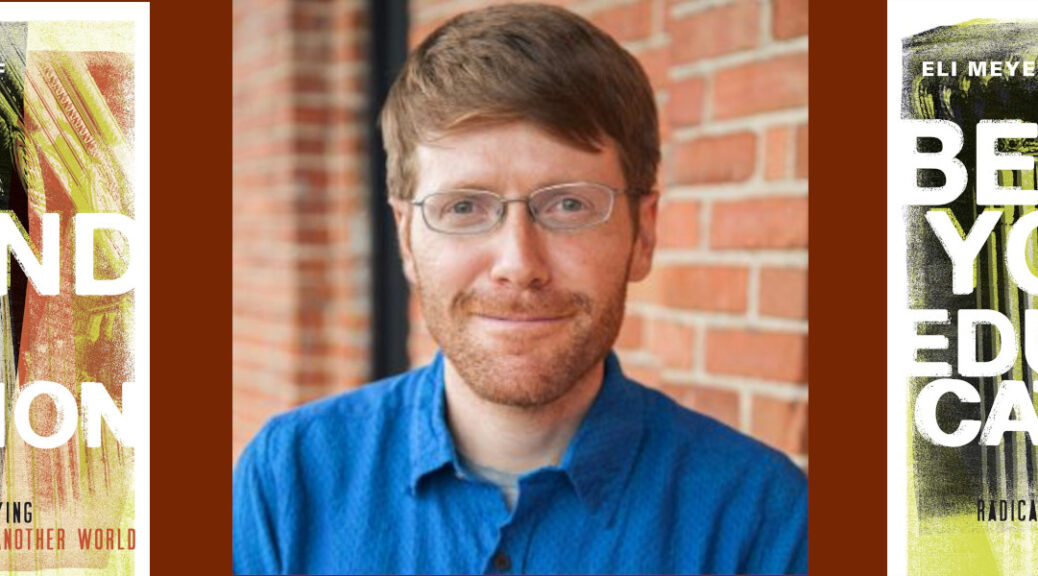Crime, Corruption, and Community Based Liberation in the U.S./Mexico Neoliberal Military Political Economy
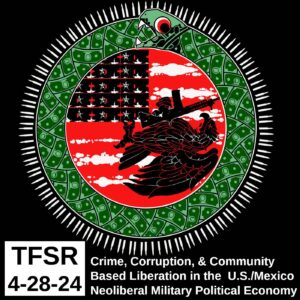
This week, you’ll hear our chat with Simón Sedillo, author of Weapons, Drugs & Money: Crime, Corruption, and Community Based Liberation in the U.S./Mexico Neoliberal Military Political Economy. Simón talks a little about his early days in media near the start of the Indymedia world, his documentary that became the news website El Enemigo Común (which translates to “the common enemy”) which covered grassroots, indigenous led movements in southern so-called Mexico, and about his book with a focus on intervention and integration from capitalist and military powers in the US, multinational banking and big pharma and the violence against and resilience of indigenous communities under that nation-state.
Check out the website https://www.weaponsdrugsandmoney.org/ for more info on how to order a copy, and the chapters are being posted and translated into castellano at https://elenemigocomun.net/ , where you can find two decades + of really interesting content. Simón suggests people follow Avispa Mídia https://avispa.org/ as a project following in the legacy of El Enemigo Común.
A big thanks to Mitchell Verter for the suggestion.
. … . ..
Featured Track:
- Get It Together (Buck Wild Instrumental) by Beastie Boys from Get It Together
. … . ..
Transcription
TFSR: Would you please introduce yourself with your name, gender pronouns, and any affiliations that you’d to share with the audience?
Simón Sedillo: Sure. My name is Simón Sedillo, he/him/they. I am the author of Weapons, Drugs, and Money. I’m a professional partner with the Earlham College Border Studies Program out of Tucson, Arizona. I am a community rights defense organizer. I also write investigative articles and research about geopolitics and political economy in Mexico and the United States. I teach geopolitics and political economy across the United States at universities and high schools, and I have done so for the last 15 years. And I’m also a Kru in Muay Thai, so I teach Muay Thai as well.
TFSR: Cool. And I use he/him pronouns and I go by Bursts. I forget to say that a lot during the interviews and it feels interrogative if I’m just like “What’s your pronoun?”
Could you share a bit about how you got involved in political activism as well as journalism?
SS: Sure, I was born into Earth radicalized and politicized. My identity is complicated. While I’m in France, people ask me, “What are you?” I’m saying that I’m Mexican. That’s the easiest thing. But it’s much more complex than that. I was born in the so-called state of New Mexico. And I am of indigenous descent. And those of us from where I’m from, are starting to identify ourselves as Genizaros. A lot of us are taking on that identity, some people have taken it on for a while. And Genizaros basically means that we’re descendants of native peoples who were enslaved in that region.
As Mexicans, we often use the word mestizo to talk about ourselves, but mestizo is just a pretty way of saying colonial rape. My identity is very much so attached to the colonial rape that occurred in the state of Mexico, both on my mom’s side and my dad’s side. That’s very much part of me, part of my physical, emotional, intellectual, and spiritual identity, and has definitely informed and contributed to the rage that I carry on this earth how I walk, and the purpose that I have behind everything that I do. At a core, I have an ancestral trauma, an ancestral medicine that I carry with me as I move forward, and all the work that I do. My book is very much so attached to that. And my work is very much so attached to that.
As I move forward in life, I’m just another criminalized youth of color who at one point, very early on in my adolescence, was very aware of the fact that I wasn’t nearly as criminal as systems of oppression, as governments, as transnational corporations, as financial institutions. This was something that very early on, I was super affected by, and I was fortunate enough to have two different things happen in early or later adolescence a homeless man I used to kick it with handed me Noam Chomsky’s Manufacturing Consent. And that definitely helped me gain some language for what I was feeling naturally. In 1994, when I was 18, about to become 19, the Zapatista National Liberation uprising in Chiapas, Mexico completely and radically changed my perspective my focus, and my future from that moment forward. That’s the root of what I did. In the United States, in addition to going into protests and kicking it with youth organizers and communities of color, one of the activities that I’m most engaged with that contributed to my getting into documentary video was CopWatch. CopWatch was always at the forefront of things that I did before anything else.
Later on, at that time I was 23-24, we have had the experience of Indymedia. And I’m a poster child of Indymedia in the sense that Indymedia activists saw the work that I was doing, and gave me access to computers and hard drives and cameras and resources to be able to go do a lot more than I probably would have ever been able to do on my own without their support. And in the end, it was the media activists across the United States who uplifted me to get into touring and giving talks and presentations. And I don’t know how the hell it happened. But all of a sudden, from those tours, I started teaching political economy and geopolitics based on my lived experiences and documentary films. And I just never stopped after that.
TFSR: It’s cool to think about the Indymedia connection right there that that was bringing you into documentary filmmaking and these other media things. Also, there’s no way to disconnect that from the legacy, the improvisation, and the revolutionary manner in which the EZLN came out to the world and engaged in their own counter-information infrastructure. That’s cool to see that coming back around.
SS: Yeah, and a lot of people don’t know. But some of the old heads from Indymedia made sure to remind people that Indymedia was a proposal of the EZLN in 1996. It was the EZLN who proposed that we start doing things like Indymedia. And in 1999, at the World Trade Organization protests in Seattle was the birth of Indymedia in response to that call from the EZLN. So we’re all connected to that.
TFSR: That’s awesome. Cool. I didn’t know that. Thanks for making that connection. I just intuited.
SS: It was actually directly connected, a call from the separatists to do so. And we did.
TFSR: Well, so you were involved in a writing and documentation project with comrades that we in Northern California were reading during the Oaxaca uprising in 2006. I wonder if you could speak a bit about El Enemigo Común. What it was or what it is? Just a bit about its shape.
SS: For sure. El Enemigo Común originally was my first feature-length documentary film called El Enemigo Común, which you can find just by typing that in YouTube. In 2004, I was filming and had a lot of footage put together but hadn’t finished yet. But we hosted the first national Indymedia conference in Austin, Texas. When I say we, I mean Austin Indymedia, we hosted it. And I was really just on the sidelines, offering support. Though I was doing a lot of work, I really wasn’t trying to get involved. But then as the conference grew, and we started to see all these people, folks told me I should present some of the stuff that you’re doing, I was already going to Oaxaca, already been getting in trouble doing video work. And that’s where I met all these Indymedia activists who were like “Oh, you gotta, get out there. You got to do stuff.” And then my friends in Austin were like “Yeah, man, you gotta get out there and finish this work and go.” That was really motivating for me to finish the film El Enemigo Común, and I went on my first tour in 2005, where I met for the first time somebody who you might know, Bradley Allen, who was he’s the main tech guy for Indybay and IndyUSA and participated in global Indymedia. And he was like “Man, you need a website.” So he made El Enemigo Común for the film tour.
Little did we know that El Enemigo Común, which came out in 2005, would basically predict the 2006 uprising and point eyes towards Ulises Ruiz Ortiz, the governor of Oaxaca, who was responsible for the repression in Oaxaca city that detonated the uprising there. And then that turned into something much larger than the film. From that moment forward, we started using the website to upload independent reporting that we’re doing from Mexico to the website, and then it just grew into the largest comprehensive bilingual website reporting on stuff from southern Mexico. More recently, there are a lot better folks doing the work. Maybe three years ago, we stopped publishing and I focused more on writing the book and we just stopped doing it because we saw that Oaxacans were doing that work at a level that was far more advanced than we could ever do. I want to shout out to Avispa Midia, who is now continuing to do that work, and they’re out there doing it. We’re pointing all eyes toward them, but we hope to wrap up the whole El Enemigo Común process and start publishing chapter by chapter of the book on there. And then just wrap it up with that and archive the website so people have access to it. But we don’t suspect that we’ll continue to be publishing reporting on that website. But we did for many, many years and did a lot, a lot of really good and powerful work.
TFSR: That’s cool to hear about that part that that website, the film, and everything played in that ecosystem. I didn’t know about the Avispa connection, but I love seeing their reporting. It’s incredible.
So now, talking about Weapons, Drugs, and Money, about the book. Could you talk a bit about what you were aiming to do with the book, what needs you were looking to supplement, and who your intended audience was?
SS: For sure. The book, at its heart, comes from that adolescent, angry, criminalized youth perspective of like there are really much more important criminals to be looking at. And from my experience from CopWatch, and then starting to travel early on to Oaxaca, and starting to do really what became military watch, and later involved into paramilitary watch. This turned into a 23-year endeavor of just documenting atrocities and the connection of US intelligence and military influence to those atrocities in Mexico. That became my work through investigative articles research and publications and documentary films. Also, along the way, doing cultural things, music, and community-based organizing things, I always had that focus on connecting repression back to the United States Empire. The book is about those 23 years of doing the work, of being in the places, of seeing things, and connecting dots to 1) really demystify this whole concept of neoliberalism in a way that makes it more accessible to non-academic, non-activist, non-intellectual communities that need accessible analysis to confront neoliberalism and militarism in that way. And then 2) to put out some very clear examples of community-based liberation movements for self-determination, self-defense, and autonomy. Those are the purposes of the book.
SS: And you mentioned who the audience is, it’s people that need to hear that information and that are going to be able to take activity, take that run with it, work with it, build off of it…
TFSR: Yeah, the book right now is primarily being sold to US universities, and now incredibly sold to us high schools, libraries, and departments are purchasing it and using it for their courses. But for me, more importantly, community organizers are buying it and using it and using it as a roadmap for critical analysis, de-intellectualization of some of these more complicated concepts, and then a roadmap towards liberation.
TFSR: That side of it, that’s really cool that it’s getting into high schools and colleges, just to counter the push against “critical race theory” that the more reactionary elements of the US political establishment have been pushing for in the last couple years, pulling back the veil and calling imperialism imperialism, instead of saying that “this is our destiny as white people” or whatever.
SS: Yeah, absolutely. It’s pretty incredible. I’m expecting probably some blowback at some point, as we move forward. At some point, I’m expecting more blowback, I haven’t really gotten any just yet, but I expect it’ll come at some point.
TFSR: It’s good to be prepared.
I wonder if you could remind listeners a bit about just the relationship between the US and Mexico, in particular, between the ruling classes of the two countries. Obviously, there’s an unequal military relationship historically and colonization that’s occurred from the US into Mexico. But what I’m getting at with this question is by pointing to the ruling classes, there is a degree of complicity among some of the more powerful elites within both countries, specifically. If you could talk about how that has shaped where Mexico is at right now?
SS: For sure. It’s interesting because people will say that Mexico has always managed to retain its sovereignty in the face of US imperialism, and they cite that there are no US military bases in Mexico. The book argues that after the Monroe Doctrine, US military and intelligence intervention in Mexico has been constant and ruthless. I say that the Dirty War era that specialists identify as existing from the 1960s to the 1980s, actually began pre-Cold War in Mexico in 1947 with the CIA’s creation of the federal defense secretariat, which was an anti-communist CIA-type organization within the Mexican military intelligence apparatus, and has continued to this very day. That has never ended. The Dirty War that the United States has waged against dissidents, social activists, community organizers, and from my perspective, more specifically, indigenous communities struggling for self-determination, self-defense, and autonomy… That war has been ongoing. We have a tremendous amount of declassified information that exposes things that are beyond the irrefutable.
One of the things that I talked about in the book is the Tlatelolco massacre in 1968. Well, the Mexican President and the Secretary of Defense, major generals, and directors of the federal defense secretariat were all working as paid CIA agents during the time of that massacre. This level of US intervention, covert US intervention into Mexican sovereignty is so overwhelming that at the end of the day, what we can say is that the Mexican military is a paramilitary of the US military-industrial complex in Mexico and carries out a certain level of atrocity that the US can then say, “Well, Mexico has its sovereignty, they’re doing their own thing. We’re not involved.” But at the end of the day, it is clearly a US political, economic, and military agenda that sets the goals for what is going on one way or another. And this is all, of course, attached to the interests of transnational corporations, extractive industries, financial institutions, and again, the military-industrial complex.
TFSR: Yeah, it was incredible in there to see the receipts. I was like “Oh, really?” I had to look it up in a couple of places elsewhere and didn’t do a bunch of deep dives, or whatever. However, it was clearly documented in articles that there is declassified information connecting them to the CIA.
SS: And one of the things I always tell people from back in the day, when I started doing the work to collect these things, if you ever do this work, make sure you download the PDFs because a lot of stuff is gone. A lot of those documents are not where I found them back in the day. And I just started downloading the PDFs many, many years ago. And now it’s all there, compiled in that book.
TFSR: Obviously, you said Monroe Doctrine. And we could unpack that a little bit if we wanted to, but also the US intervening in other countries under the rubric of anti-communism, which during that period was synonymous with denying national liberation struggles or indigenous sovereignty struggles?
SS: Absolutely. What I always say is it had nothing to do with anti-communism, it had to do with pro-US political economic, and military interests more than anything. Anybody that even remotely challenged those interests, anybody that remotely organized and opposed them. At the end of the day, those interests are the military-political economy of white male supremacy. Anybody that specifically challenges, opposes, and worse, provides an effective alternative to contributing to the military-political economy of white male supremacy is considered a military target. And that’s what we saw going on more than communism. And that’s why I say it’s ongoing because back then the excuse was communism, that has excuse later evolved into terrorism, and now has evolved into the narco. But what we’re seeing is that those are all excuses to specifically target communities who are struggling for grassroots community liberation.
TFSR: Well put. The first time that I heard the term neoliberalism, it was about a critique by the Zapatista movement. But it’s a word that I feel gets bandied about without a good definition sometimes. I wonder if you could give us your working definition of the term, and some of the institutions associated with the framework.
SS: One of the things I’m proudest about what the book has done up to date, right now, since its release, is that I get constant feedback from university professors that say, “Finally, I have a book that I can give to my students, and it’s not a bunch of information that I have to synthesize to them, this is something that they can read that is accessible to them to understand these concepts that are extremely complicated.” Neoliberalism is just the most current incarnation of capitalist imperialism, which are also two words that people like to throw around without really digesting. All we’re saying is the taking of land, labor, and resources by force for profit.
What I did, in particular, with my definition of neoliberalism, with, of course, the help of the Zapatista analysis was to add the militarism component. People tend to focus on the political and economic that is the money and power behind how neoliberalism works. But if you don’t talk about the military strategies employed to enforce those strategies for political and economic power, then you have an incomplete definition. My working definition that has been entering and being circulated around academic institutions in the United States over the last couple of years, since even before the book was published, is that neoliberalism is a military political economy, that prioritizes the interests of transnational corporations and financial institutions over the basic rights of communities. Now, that has also evolved into not just a military political economy, but – with what we witnessed in Chiapas, Oaxaca, and Guerrero – a paramilitary political economy. And now more recently, and more clearly, a narco-paramilitary political economy, that has these specific interests in mind more than anything: extracted resources and for-profit weapons proliferation? That’s in a nutshell, my definition, I don’t feel it needs to get more complicated than that.
A lot of the literature that is out there, a lot of the academics that talk about this stuff, I feel they over-intellectualize and make it significantly more inaccessible for people to even try to digest and really go through some of this stuff. But it’s not that complicated. What is complicated and what the book helps with is identifying characters, and agents of neoliberalism, if you will. I broaden our understanding of the industrial complex and not just talk about the prison industrial complex, not just talk about the military-industrial complex, but talk about all of these different industries that participate as industrial complexes in complicity with legislative bodies, in complicity with financial institutions, in complicity with criminal activity that is profitable to the US. More recently, one of the things that differentiates neoliberalism from other incarnations of capitalist imperialism is that neoliberalism has always fronted like it’s seeking out democracy, it’s seeking out social responsibility, and that’s the whole lie. You can’t take people’s land, labor, and resources by force for profit in a socially responsible or democratic way. And that, in a nutshell, is the difference between neoliberalism and other incarnations of capitalist imperialism. Fortunately, that veil is clearly completely falling to the wayside, not just what we’re seeing happening in Palestine, but what we’ve been seeing happening all around the world consistently over the last 40 years. They’re no longer able to keep this facade that has anything to do with democracy and social responsibility and that is still dog-eat-dog capitalist imperialism. “Take whatever you can take, however you can take it.” And for me, this is how organized crime feeds into it so effectively. Organized crime is to neoliberalism what war was to capitalist imperialism. And that’s what we’re experiencing in Mexico today. Does that make sense?
TFSR: Yeah. That’s a really good way of putting it. Instead of necessarily just foreign military invasion coming in, it can be state actors or para-state actors, whether they’re narco or narco-adjacent, going in and displacing a community so that foreign corporations can come in, and there’s no resistance to them. Depopulating a forest for instance.
SS: Absolutely. That’s it in a nutshell.
TFSR: It’s very well put throughout the book as well.
One thing that I didn’t ask here that I think this would be a good place is for us old heads who were up during the alter-globalization period, the Bretton Woods organizations are going to stick in their head as tools for the international imposition of neoliberal structures. And it’s good to name those organizations, like the World Trade Organization, the World Bank, the IMF, the International Monetary Fund, which are continuing to force neoliberal structures into places. The Zapatistas rose up in part in opposition specifically to NAFTA and the changes in the constitutional laws, or the ignoring of constitutional laws, protecting communal lands. I guess, in the last couple of years, the Mexican legal system has been somewhat shifting internally towards a model that is more corresponding to the US individual and property-focused legal system. I wonder if you could talk a little bit about not only the military displacement immediately but also the legal, primitive accumulation that’s happening in Mexico?
SS: For sure. It’s multifaceted. It’s it has a lot of different layers. NAFTA did a lot of different things. We could spend weeks just talking about NAFTA, it’s a huge document, and it had a huge impact. But there are three things that I feel that identify in the book that are key.
First, NAFTA forced the revocation of Article 27 of the Mexican Constitution, which granted Mexico’s indigenous people communal property ownership over their collective lands, which made it so that their lands couldn’t be sold as individual parcels. NAFTA made it… “Hey, we should really cut this up into individual parcels.” The same thing happened in the 1850s-1890s in the United States, with the Dawes Act. Parceling up native lands so that it’s a lot harder for Native people to stay cohesive and control their territory and be able to resist. The good news is that this has been highly ineffective. The bad news is that the response to its ineffectiveness has been the creation of more paramilitary and narco-paramilitary activity. That has been the response and that’s what we’re going through now. The Zapatistas are just in the last decade really starting to confront more narco-paramilitarism than any other form of state-sponsored violence against them.
Second, NAFTA allowed for the introduction of US agribusiness corn into the Mexican market, which is an interesting question. Mesoamerican native people basically invented corn, there was no need for US corn. It was a staple crop for subsistence survival and organizing in Mexico. The question is here how did the US make it for US corn to be even marketable in this environment? Well, the US government subsidized US corn to be sold at a cheaper price to undercut the Mexican campesinos corn. This was a direct attack on indigenous forms of self-subsistence. This is one of the things that the Zapatistas were like “This is a death sentence for us” between the privatization of Creole lands, introduction of US corn, and now of course that has turned into the introduction of several different crops, not just corn.
The 3rd thing I talked about in terms of NAFTA is this Chapter 11 stipulation. Chapter 11 in the document basically says that transnational corporations who invest in At that point, it didn’t matter if it was Mexico, the United States, or Canada, but a transnational corporation had an investment for, let’s say, an extractive activity that could create an environmental situation or a labor situation. If anybody tried to stop that transnational corporation from carrying out their profitable activity, that transnational corporation could sue, including suing federal governments. Who heard these cases was a NAFTA tribunal. Oddly enough, it was the Trump administration that was like “Wait, we need to opt out of this.” And they did, they brought up and they have now this new iteration of the same agreement where Canada has completely opted out of Chapter 11, and the United States has opted out of most of what could be damaging to its territory. But Mexico has continued to be forced to adhere to Chapter 11. And this is the thing, basically a contract that subverts national sovereignty. And in doing so that specifically targets native communities. Today, we are now in a situation where we have an industrial corridor being imposed by a supposed leftist Mexican federal government that has for-profit contracts being carried out by the Mexican military to impose this industrial corridor. And this is all legal under that framework. Those three things set up a situation where there was no way to confront this other [than] through direct action. The Zapatista response and the response of other community-based organizations that have either chosen to take an armed or an unarmed route, but a more direct action route to this have been the only things that have not been affected. Does that answer your question?
TFSR: Yeah, absolutely.
I wonder if you could talk about some of the throughlines that your book broke down between neoliberal policy and its ideological and violent imposition via US arms, military, and enforcement agencies and their proxies in Mexico. Can you talk a little more about the CIA-DFS connections or how the School of the Americas, currently called WHINSEC, fits in there? And the one part that I’m really excited to hear about is what you were talking about during the training, specifically focusing on counterinsurgency and privatization of land?
SS: There’s a lot here. I’ll talk about the School of the Americas and I’ll go directly to that from that.
The US Army School of the Americas, for folks that don’t know, is responsible for atrocities throughout Latin America. Virtually every single dictator, except Augusto Pinochet in Chile, was trained at the US Army School of the Americas. His DINA agents known as his Gestapo, were mostly trained at the US Army School of the Americas. In terms of Mexico, we have a list of more than 1700 Mexican military personnel trained at the US Army School of the Americas from 1955 to 2003. The names from 2003 forward have never been released. The last time activists made a major push with US legislators to try to get those names released, it was actually the Obama administration that suppressed the release of those names. And the thing is that as we move forward, we uncover more and more names of Mexican officials trained at the US Army School of the Americas.
Specifically with NAFTA, there’s a situation that is so clear. One year after the Zapatista uprising in 1995, a John Hopkins University expert by the name of Riordan Roett released this memo to investors from the Chase Manhattan group that have invested in the North American Free Trade Agreement. He specifically talks about the Zapatistas as a threat, and he says, “I don’t really think they’re a threat, but investors do consider them a threat.” And in his memo, he’s like “We really think the Mexican federal government should eliminate the Zapatistas.” Those are his words.
At this time there was a transition in the Mexican government from President Carlos Salinas de Gortari to Ernesto Zedillo. There was actually an assassination of a Mexican presidential candidate in there that we don’t need to go into. But Ernesto Zedillo sees this memo and he’s like “Okay, we need to do something.” He activates this Mexican general by the name of Jose Ruben Rivas Peña, who is a US Army School of the Americas graduate and is the creator of most of the paramilitary organizations that were used against the Zapatistas during this time. So the Mexican military offensive turns into this paramilitary offensive to create deniable atrocities to erode the separatist support base.
And this is a point at which we see what we’re seeing now – a series of different strategies to carry out deniable atrocities against anything and anybody who’s considered a threat to the US neoliberal military political economy in Mexico. We have to understand that farmworkers, students, Native people, Central American immigrants, teachers: all these sectors of society are already considered disposable. There are disposable variables in this economic equation. But if any one of these sectors successfully organizes alternatives or challenges to white male Christian neoliberal military political economy, then they’re considered a military target. And that’s what we’re experiencing now – huge swaths of society being considered military targets.
That’s pretty heavy to be declaring without some concrete evidence, without something else to back it up. Most of us know that most Mexicans who are involved in anything know this. But that’s pretty hard to say without something more concrete. Well, at the end of 2006-2007, I went to give a presentation of a documentary film at Kansas University in Lawrence, Kansas. Randomly a good friend of mine was in grad school there and she invited me to give this talk. And when I went there, she showed me “Hey, look, the local university newspaper is publishing this article that says our geography department here at Kansas University received a $500,000 grant from the Department of Defense to map communally-held indigenous lands in San Luis Potosí and Oaxaca, Mexico. We’re like “This is it.”
And a whole large group of us dove into that. And we found out that this project is a military mapping project called Mexico Indigene, the Mexican incarnation of it. In the United States, it was called the Bowman Expeditions. It was run by the head of the geography department. His name is Jerome Dobson. Now, sidenote, the anthropology department at Kansas University has Felix Moss, and most people don’t know who Felix Moss was. But Felix Moss was the author of the human terrain mapping systems that the US military was engaging in during the wars in Iraq and Afghanistan. They already had this precedent. Well, Jerome Dobson basically decided he wanted to do this for geography. The idea was that they were going to work with the US military to begin mapping these lands in collaboration with the Department of Defense. The Department of Defense official involved in this is a lieutenant colonel by the name of Jeffrey Demarest. Jeffrey Demarest was at the time working at Fort Leavenworth in Kansas, and he was a senior analyst with the Foreign Military Studies Office. They’ve changed their mission statement, because back then we published it. At the time the Foreign Military Studies Office’s main mission statement was that they focused on asymmetric and emerging threats to US political and economic interests, asymmetric are armed criminal organizations, and guerrilla movements, but emerging threats are very clearly social movements. So, this guy Jeffrey Demarest, is also a US Army School of the Americas graduate, and he’s one of the authors of Plan Columbia in Columbia. He worked with Professor Jerome Dobson and another underling by the name of Peter Herlihy, together with a group of graduate students from Kansas University. And they went to San Luis Potosí and Oaxaca, and into native communities and lied to them, and said that they wanted to do a participatory mapping project with them to help them defend their communities against neoliberalism. All the time, with this DoD funding. Well, we put two and two together, and we’re able to… We were scared when this was going on because it was hard to figure out where it was going on and how. Oddly enough, it was going on with people that we knew but had no idea what was going on. Some people at one point saw a Foreign Military Studies Office logo on weather maps that were originally presented, and then they removed that. So other people never saw that again, so it was a question that came up, but people didn’t follow up on it.
Eventually, we were able to track where the mapping was going on. And the mapping was going on in communities that were unarmed, not engaging in any guerilla activity or anything that. But communities that were practicing traditional forms of collective or communal land tenure, and traditional forms of self-governance. And they were being targeted. Well, Jeffrey Demarest published a series of articles and books publicly about his thoughts on this. And basically what Jeffrey Demarest says is that communal property ownership leads to insurgency and criminality, and the only solution is privatization. We proved irrefutably that there was a US military counterinsurgency strategy being carried out in Oaxaca, targeting Native communities who practice traditional forms of land tenure and self-governance, which is at the core of Native survival. So this was a strategy of genocide that was exposed. And we got them kicked out. Communities came together, they found out, boom. We organized, we shut that down, they got kicked out, I spent the following four years hunting down the grad students who participated unwittingly and finding each and every single one and making them cry in public presentations that I did at Kansas University, showing them what had happened.
Like I said, this had already happened in anthropology, and the American Association of Anthropologists did, at one point, make a public ban on this type of activity and called it an ethics violation. And we’re like “We can’t support this.” Jerome Dobson from Kansas University was about to become the president of the American Association of Geographers. He was already the president of the American Geographical Society, which was already an elitist organization, but the American Association of Geographers is an academic, more popular thing. He was about to become the president, was a shoo-in, and we were able to shut him down. Just killed it for him. He got called in by his internal review board, he said he was going on sabbatical, and then that he wanted to go work directly with the State Department. His academic career was over. That all happened quietly. They’re out there, still doing this work. The American Association of Geographers has still to this day yet not said anything. Because geographers are like “Where are we going to find work? Work is with the military at this point.” And it’s been an issue. There are plenty of badass radical geographers who have been on board, continue to support my work, and continue to confront this issue. And still, to this day, I get emails from geographers who are like “Hey, I got offered this job and I started to ask questions and it was another fucking military mapping job, and thanks for your work. I didn’t take it. I didn’t get duped!”
This was the smoking gun. At the end of all this talk, we can say. A lot of people were like “This is conspiratorial.” Well, no. The this this was a fact, this was happening. This was intentional. And this was what their philosophy was. And that was fully exposed. It’s important to say that this all was detonated at the same time as the 2006 Oaxaca uprising. The importance of traditional forms of self-governance and land tenure in being viable methods of confronting the neoliberal military political economy were considered so viable that the US military was involved. At one point I shared this with guerrilleros from the community uprising against narco governance in Cherán in Michoacán and some of the Guardabosques (Forest Defenders) started to cry because they were like “Man, we’re being targeted by the US military apparatus.” And at the time, their commanding officer was like “Hey, man, I don’t know why you’re crying. If we’re being targeted by them, it’s because we’re badass. And that is what you need to take away from this.” And that’s true. At the end of the day, it was all very true. What people are doing is and continues to be the most effective way to confront these strategies of neoliberal military political economy in Mexico. Does that answer that?
To me, that’s probably one of the most important things that I ever did. And also, got me the most political blowback and threats and harassment from both the US government and the Mexican government in all of this work. My family was threatened, and I was followed. People’s cars got ransacked, and houses that I stayed at in Lawrence, Kansas, while confronting the graduate students. Over the top things happened during that time. I haven’t had issues like that since, but at that time, that was the peak of the type of harassment that I ever received for the work that I did.
TFSR: That’s super scary, especially because you were literally uncovering this genocidal pattern of ongoing settler colonialism, or just colonialism, the tip of the spear, pointing that out. That’s definitely going to put a spotlight on you.
SS: It sure did. JTTF [Joint Terrorism Task Force] went and threatened my parents. It was rough.
TFSR: Don’t mess with academics, I’m telling you.
There are a lot of inspiring stories that you share of indigenous-led liberation movements, past and ongoing in Mexico, in the book. Many listeners obviously will have heard about the Zapatistas, we’ve been referring to a few times. But I wonder if you could speak a bit about some of the other examples that you bring up. And some of the wisdom that can be gleaned for land defense and community liberation struggles elsewhere, particularly for racialized and marginalized and indigenous communities.
SS: For sure. There are four situations that I look at: obviously, the Zapatista National Liberation, and the Oaxacan People’s Popular Assembly during the uprising in Oaxaca City in 2006. Before that, the National Autonomous University student strikes in 1999, which was instrumental to all my political education because I went there, as that was happening and they’re the ones I met in Oaxaca and showed me everything that I learned to do the things that I’m doing to this day. And then the last one is the P’urhépecha municipality of Cherán in Michoacán, which rose up against narco governments effectively in 2011 and has been an ongoing communal, self-governing project that is super effective and has been doing very well. Really out of those, the native ones are Cherán and Oaxaca.
Oaxaca is a city, but it’s a very native city. A lot of natives in Oaxaca would not consider themselves native because they live in a state where you go up in the mountains and people are native. But the reality is that they’re more and more native than most places. Oaxaca City is probably one of the most native cities in the hemisphere. And the influence of traditional forms of self-governance influenced that uprising in a super powerful way. And that’s super important to point out what I focused on in the book more than anything was all the layers of repression that the state government had to do to confront it. There were so many layers of not just urban youth paramilitaries, paramilitary death squads, military, and police doing illegal drive-bys – every possible tool of repression that was available to the state was used. And that’s what had to happen.
What I learned from this, even before seeing what we saw in Cherán, which just reinforces the idea, is that the greatest form of political power is not any political power or any political party, or any politician or any platform or reform. It is thousands of people willing to risk everything to affect change. You have thousands of people who are willing to die, and that makes radical change. That’s what the Zapatistas did. That’s what the Oaxcan People’s Popular Assembly did. Though, it wasn’t completely effective in kicking out the governor, making any long-term radical change, what they were able to do, taking over an 800,000-person city for six months and holding it for six months, and then forcing this level of multi-layered repression to be used to shut it down over six months. And then finally, a federal military police force was bought in and it took them two months to shut that down. That level of resistance is incredible. It’s historic. And then in Cherán Michoacán, a P’urhépecha community that rose up against the narco government, we’re talking about a 25,000-person community that has now prohibited electoral politics in the community, has banned institutional forms of governance, has done their best to return to traditional forms of self-governance, took away the cops’ weapons, still hold those weapons, still have their own community-based policing and forest patrol. Thousands of people put their lives on the line gets the goods.
And that’s what it is. Now, obviously, we’re in a situation where with Palestine, where we do have thousands of people that are willing to die, and they’re being killed. And nothing is happening to end that. We’re all being exposed as a sham. Our humanity is being exposed as a farce. None of us is radical enough or powerful enough to do anything in this situation. And I don’t have an answer for that. But the examples that I give in Mexico were able to effectively put their lives on the line and effect radical change.
But I want to be honest and be like “I’m in tears. I’m… I have to bow my head. I have to bow my head in shame. Because I don’t know what I could do to contribute to Palestinian liberation in the face of the genocide that we’re seeing right now.” I haven’t really had a platform to talk about that in any way. I haven’t really had the space. I don’t really consider myself knowledgeable enough or valid enough. I feel like scum over that. And I don’t know what to do. But it’s important to point out that what I’m saying is definitely contradicted by that situation. And we need to really re-evaluate absolutely everything that we’re doing as organizers, as resistors, as radicals, as academics, as activists, as a community, as humans in the face of what we’re seeing happen there. But I do think that we can draw from these experiences and think about what possibilities can look like. And when it comes to liberation in an urban setting in the United States or in other places in the world, we can think about– I always talk to my students in the United States and I say, “You all live in a prison of your own comfort.” One of the main ways that we’re controlled is through comfort. I am not talking about people willing to risk their lives, in the Global North, people aren’t really willing to risk the hot water, the AC, their jobs, their cars, their flat screens, their bongs, or their kicks, or all these different things that make life so comfortable. And we’re being held in a prison of that comfort. And now is a supercritical moment in the face of what we’re seeing to begin to talk about how are we going to get more uncomfortable.
We have to really start to ask ourselves, what are we willing to risk and sacrifice to contribute to global liberation? And that includes Palestinian liberation, that includes liberation for all the people that are confronting the global military-industrial complex, the US monetary hegemony, all these powerful things that are clearly willing to annihilate us for their political, economic, and military agenda.
Hope I didn’t veer too much there. I think it’s important to put that in there one way or another. I haven’t had a platform where I felt like I could put that in there. But it’s important.
TFSR: Yeah. And even not having an answer. The asking of the question is good, it’s not gonna get answered if people aren’t asking it.
One question that I did have, that ties into that is Mexico is likely surpassed only by Palestine in how dangerous it is for journalists. And journalism, we have to admit, if you have the idea of a population knowing what’s going on, you have to have concerted efforts to find out, to get that information out. It’s a core to being able to popularly organize. I don’t know if like you’d to speak a bit about the importance of independent journalism in Mexico, and the danger that it poses to the impunity of the state and capital there. And also, maybe, if there are any other projects, besides Avispa that you want to shout out that are doing a good job, that people should pay attention to.
SS: Right now, it’s all Avispa. I would point at them more than anybody else. I love their work. I have a personal relationship with them. Right now is a particularly complicated moment, because we have this supposed leftist president who turns out as an evangelical Christian and is far more neoliberal and has effectively militarized the Mexican state much better than the National Action Party or the Institutional Revolutionary Party were ever able to do under the guise of this supposedly leftist agenda. And it’s absolutely frightening.
There are soldiers, and the new military police, known as the Guardia Nacional, the National Guard, is everywhere. And under this leftist president, the general in charge of the Guardia Nacional, General Bucio is a graduate of the US Army School of the Americas, too. And that’s where we’re at.
We’re in a situation where I fear for independent journalists, I fear for journalists in general. Fortunately, the homies are good, they know how to move. They don’t have kids, not having kids is key, things change when you have kids. And they see, they know when it’s time to bust a move when it’s time to go under or when I started to pop up, how to hide their identities and things like that, and they do their work good, but I’m always going to be concerned for their safety and their well-being under these conditions.
That said, the work that they’re doing is super powerful and super important and needs to be shouted out. And if you see a donate button on their website, if you see any way to support them, I don’t know if they’ve done anything out there for that, please support Avispa Midia, I would support them above anybody else right now.
TFSR: One of the riveting parts for me were the chapters laying out the origins and implications of what you termed the “pharmafia” and the “banksters”. And their lack of oversight by the lawyers and politicians, filling the government seats in Mexico, the US, and elsewhere. In particular, it wasn’t mentioned in there, but some of the corruption scandals around HSBC really came about at the same time as the housing crisis was hitting a lot of North America, too, due to the banks overleveraging… I don’t even understand the math of it. But financializing the housing markets and specifically throwing borrowers of color under the bus and then getting written off by the government. But I wonder if you could talk a little bit about that corruption in the industries and the impunity when it comes to government with that.
SS: Let me start with what you mentioned about the housing. I actually have a chapter that was gonna go into that, and I just didn’t feel it was complete enough, and it veered a little bit. But one of the things that is super important to know is that there was a Justice Department official at some point, I believe it might have even been Lanny Breuer who did a talk on the HSBC case, he was prosecuting the HSBC case, that said that the 2008 financial crisis was cushioned by a lot of this cartel money in the banking industry. What is super important for people to understand is that cartel money – and this is also from the Justice Department – three-quarters of cartel money ends up in banks, in major international banks, US banks. And many of these banks have been busted for just allowing this to happen. They receive what are known as deferred prosecution agreements, where nobody gets busted, and they pay a fine and this all gets swept under the carpet and continues to function exactly the way it has always functioned.
The HSBC case is super important. I put the entire deferred prosecution agreement in there and reorganized it because it’s so important for people to see how profound and clear the complicity of bank executives was in this case. And I threw in there, that there were all sorts of money laundering organizations, and the government is always talking about busting these money laundering organizations. You’re talking about $2 million-$3 million from some group of cholos, or Chinese restaurant owners that did some money laundering, maybe even under duress. But we’re talking about hundreds of millions, in some cases, a couple of trillion dollars of laundered money in these financial institutions and nobody got locked up.
The HSBC case in 2012 the Justice Department was able to prove that HSBC executives, both at the International and the US offices, were aware of what was going on. This is published in the New York Times and Salon magazine. And one point, the New York Times is the one that asked Lanny Breuer, “So you bust the bankers, somebody’s gotta get locked up.” And Lanny Breuer was straight up: “They are too powerful to be locked up.” At that time, the Attorney General was Eric Holder. This was all under the Obama administration, which is always interesting to point out because people are like “Oh, Obama was great. Trump is-” Obama was whack. And his Attorney General was whack. Both Eric Holder and Lanny Breuer used to work for Covington & Burling, but this is a law firm that specifically defends banks from money laundering charges. And then they started to work for the Justice Department. And then they both went back to work for the law firm before the deferred prosecution agreement was done with HSBC. Anyway, that to me is a revolving door and that is incredible. HSBC received a $1.9 billion fine. Five and a half years or five years of independent monitoring. The independent monitor released– somehow we were able to get a little bit of the report on the fourth year, and he was like “Yo, nothing’s changed.” In the fifth year when the report was supposed to be made public, the Obama ministration suppressed the release of the report citing that it would expose vulnerabilities and they were not able to expose a whole system of corruption and it is never going to be released. The law journalists from BuzzFeed that did the last FOIA request for it were denied. Actually, it’s never been released. 17 banks that have multiple different prosecution agreements for continuing to launder cartel money. And to me, this exposes just a huge hole in this entire system. To me, this is one of the things that makes nation-states illegitimate, in and of themselves. And that’s what I’ve been touring about right now in February – the nation-state is illegitimate. We didn’t stop even considering nation-states legitimate at all. There are maybe 200+ nation-states in the world, and there are over 5,000 stateless nations in the world, like Palestine, that are being targeted and slowly annihilated by these 250 criminal nation-states around the world. And this type of activity is to me what most exposes criminality and illegitimacy.
When it comes to the pharmaceutical industry, just to get to the part of your question: I didn’t know that the pharmaceutical industry was the largest lobby out of all industries. I would have come for weapons or oil, the pharmaceutical industry is four times as big on lobbying than the weapons industry, and two times bigger than the oil industry. And these guys! At the time that I wrote the book, I was like “Why don’t we have a Netflix show on it?” And finally, Netflix did do some shows. But of course, the Netflix mini-series and movies that have come out about pharmaceutical, the Sackler family, Purdue Pharma, and they did one on Inys. What’s his name? John Kapoor… He was the only pharmaceutical CEO of color. Of course, he did time. I can’t remember his name. But they make it out like these isolated-
TFSR: The bad apples.
SS: Yeah. But at the end of the day, it is the whole system. The amount of legislators that have allowed the banking industry and the pharmaceutical industry to get away with the type of criminal– In the case of the banking industry, the laundering activity. In the case of the pharmaceutical industry, the influx of addictive substances into the United States population. I talked about this in the book, that the Mexican cartels are now producing pill-form opioids to compete against the pharmaceutical industry. That’s the point we’re at now.
The pharmaceutical industry straight up stole DEA officials who were in charge of investigating the pharmaceutical industry and hired them to work for them. We don’t even talk about narco governance. And yet we can talk about narco governance in Mexico and talk about the corruption and I can tell you, we are at the point where you don’t know if political power, business elite power, or narco power is more powerful than the other. My conclusion is it’s about the same because it varies from place to place, but they have about the same amount of power across the board and it overlaps and that’s clear. And I don’t write about that because all you have to do is Google stuff and watch a Netflix series and most of it is legit. That’s how it is. But that’s not really the bigger deal. The bigger deal is the narco governance within this supposed official admin empire, the official US government apparatus.
The corruption between the pharmaceutical industry, the banking industry, and US legislative bodies is so overwhelming and so responsible for the opioid epidemic, so responsible for allowing narco activity to continue to go on in Mexico, so responsible for the for-profit weapons industry, the prison industrial complex, all these different things that are just criminal at their core, that I don’t really think anything else is so important to talk about anymore. Cartels are fucking horrible. Yeah, they do horrible things. But at the end of the day, when you have this so-called legitimate system that facilitates and profits and regenerates all that violence, that’s where our focus should be. And that’s where we need to start turning our heads in talking about de-legitimizing the nation-state in and of itself, its financial institutions, and transnational corporations. From there, we may get somewhere where we can break this down enough to where we can hope to generate some real global liberation that includes Palestinian liberation. That’s my hope.
TFSR: Most of the listening audiences are in the US, and most of the radio stations that it plays on are all in the US. I wonder if you have any suggestions of practices and actions of solidarity concerning the impacts of the US border, arming and training of paramilitaries or official forces, and US economic policy towards those impacts [on] people south of the Rio Grande that you’d suggest listeners consider engaging in or learning more about?
SS: I fear free all, and I hate to do that, I hate to put that out there. It’s not that easy. When I go to the States, it’s so scary. If we did this, we did this ad hoc, probably not very scientific analysis about how effective has the far-right been at constructing grassroots community-based self-determination, self-defense, and autonomy in comparison to the left in the United States. And the number disparity is absolutely astonishing. We figure there are probably a good 10 million white supremacists who are stockpiling food and weapons have safe houses and are preparing for a super frightening situation. And when you look at us, the numbers are pretty low. The only thing I can say is that positive there is, though they do seem to have some unity on certain points, then they end up eating each other alive. Over time, we’ve seen the different immigrant-hunting organizations, they have had pedophilia exposed and some kids shot them dead. And they have all this stuff that demonstrates they’re not really as united as you. But still, 10 million is a lot of people. And I don’t feel that people are taking that seriously enough.
I don’t feel like people are considering what we’re confronting. We’re confronting a global movement towards far-right fascism. The way things are going is that the for-profit industries and the nation states that we are talking about as criminals, are every day becoming less interested in continuing the theater of false democracy and social responsibility, and very much so willing to enter into political, economic, and military fascism to obtain their goals. The day that Trump won the election I took screenshots. There’s an article on El Enemigo Común. It’s called “The Face of Neoliberal Fascism.” I took screenshots of the US stock market and looked at the weapons industry, pharmaceuticals, real estate, banking, just the cream of the crop, and everything skyrocketed that day. The entire economic apparatus was like “Yes, this is what we need. We need to have free rein to do whatever they want. And this didn’t give it to us.: Clearly, as things progressed, people were like “Wait, wait, wait, this guy’s kind of over the top.” But the attitude behind it is that.
One. Two, people need to stop having this idea that the far right is some hillbilly in Alabama. We learned in 2016 that is tech bros, that is gamers, that is dudes with $100,000-200,000 a year salaries and good jobs and college educations. And they’re being like, “Hey, I am interested in my self-preservation. I’m interested in my self-determination, and my community’s autonomy, all the while having these anti-capitalist, anti-imperialist undertones to their argumentation, that is legitimized when they look at things like the Democratic Party, or anything that is “liberal” in the United States. None of that stuff is confronting the nation-state or transnational corporations or the US political economy in any real effective way. It’s further legitimizing the US military-political economy by participating in it. But I feel like it’s really easy for the far right to point at liberals and the left as a legitimizing force of wealth and power inside of the US military political economy, as opposed to anything that is confronting the true corrupt nature of our government.
One. Two, this young woman, a friend of mine’s daughter, the other day was like “One of the fucked up things is that y’all on the left are super inaccessible and super closed off, and super critical of everybody. But those guys in the right, they like anybody, and anybody that has any wack ass ideas, they’re all like “Yeah, come hang out,” and they’re growing in this way that we’re not. And we really need to think about what are we doing to grow as a movement to really challenge the far right. I don’t have any answers there. At this point, my faith is in the youth.
My book is like my report, like this is what we saw, this is what’s going on here, please take this and run with it and figure out what we gotta do. We are failing. My generation has failed to provide a truly effective confrontation to this situation within the United States. I implore older people, if you’re older than 30, and you don’t have mentors younger than 30, you’re probably a fool. And that’s where this is gonna go, we need to start listening to what young people are thinking, what they’re gonna start proposing, what they’re gonna look at, how they’re processing information, and what type of proposals they’re gonna have. We need to provide them with the tools of what we’ve been able to see, so they can effectively challenge this.
TFSR: Well, thank you so much, Simón for having this conversation. I’ll put in the show notes where folks can get the book. Are there any places you’re blogging right now or are you working on other projects or ways that they can– I guess you’ve got a website if you want to name that?
SS: Yeah, the weaponsdrugsmoney.org is where you can get the book. We’re gonna be like I said, publishing chapter by chapter once a month on El Enemigo Común. The book has been translated into Italian and Spanish, and we’re about to get French going. It’s gonna start moving all over the place. In the United States, Spanish and English are available on the website, and institutional copies for academic institutions, for higher learning institutions, go along with the PDF so that students can get the PDF for free. I don’t want students to have to pay for the book, but I do want academic institutions to pay an extra fee for it. We’re trying to get those out there. They’re starting to move little by little. You can find Weapons, Drugs, and Money on Facebook, and Instagram, and communicate with me there.
TFSR: Awesome. Thanks a lot for having the chat. I really appreciate it.
SS: Thank you so much for your time. Thank you so much for your work. I really appreciate the platform.
TFSR: It’s my pleasure.


